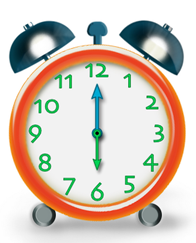Stop the Clock for Two
Here's a game to play with an adult!
How do you play?
You'll need an adult to play with.
You'll also need a set of blank clock faces, or you could use the interactive version.
Set the time on the clock to 6 o'clock to start the game.
Starting with the adult, take it in turns to move the hands of the clock on by $\frac{1}{2}$ hour or 1 hour. For example, the adult could choose $\frac{1}{2}$ hour, so the clock hands move to 6.30, then you might choose 1 hour, moving the clock hands to 7.30, and so on.
The winner is the person who moves the hands exactly onto 12 o'clock.
Does it make a difference if you go first instead?
What happens if the adult gets to 10.30? Why?
Can you work out a winning strategy?
Stop the clock helps to develop children's fluency with telling the time and calculating time intervals. However, the real challenge is to find a winning strategy!
Easier version: start at 9 o'clock instead of 6 o'clock.
Harder version: try using different time intervals e.g. $\frac{1}{4}$, $\frac{1}{2}$ or $\frac{3}{4}$ hour.
Repeat the game, aiming to find a winning strategy, then talk together about how it was found.
There's a classroom version of this game here.
